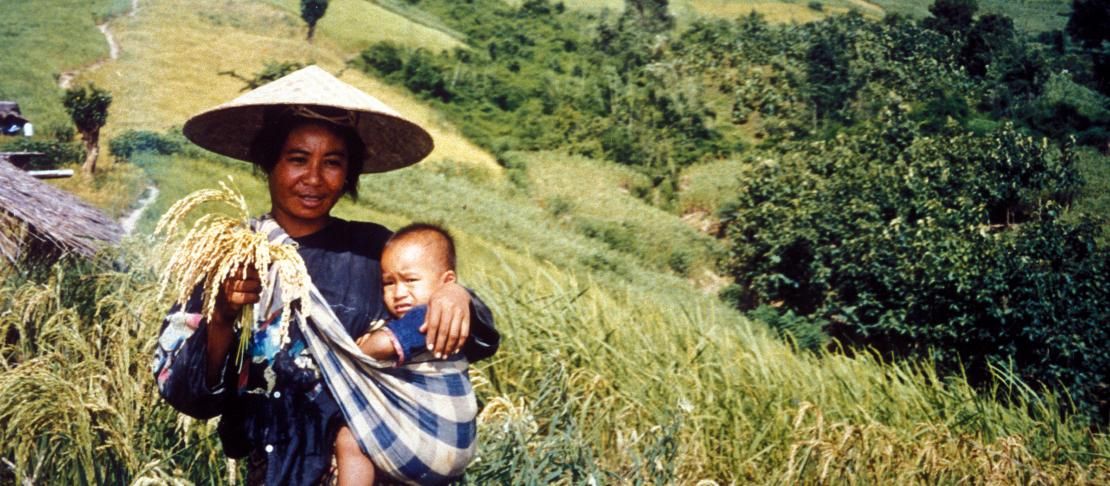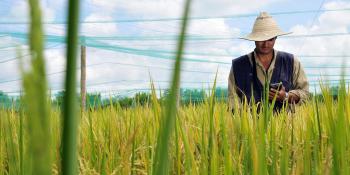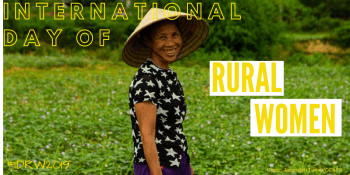From wives to managers: Tackling climate change with women farmers

As climate change impacts men and women differently, women's roles in farming should be recognized when introducing climate-smart practices to communities.
Paint me a picture of farming and more often than not the first image to pop up would be of a man tilling the ground, preparing for the season’s crops.
There might not be so much as something wrong with the picture, but instead, something (or someone) missing.
“We often do not recognize the role of the woman as a farmer, income-earner and contributor to the economy,” says Dr Thelma Paris, socio-economist and gender specialist with the CGIAR Research Program on Climate Change, Agriculture and Food Security (CCAFS), during a roundtable discussion on enhancing the resilience of smallholder farmers.
women do contribute much more to farming than is realized by most
The visible work of men on farms, she says, focuses mainly on the heavy tasks such as land preparation, while women farmers usually help in establishing and harvesting the crops. However, gender research in south Vietnam has shown that women do contribute much more to farming than is realized by most. In fact, women are increasingly taking over tasks which used to be assigned to men.
Painting a different picture
Dr Paris paints a slightly different picture of a rice farming household in the Philippines. The women take up traditional roles in the home, including taking care of the children and doing household chores, as well as farm-related tasks, aside from taking care of the small livestock and supervising laborers. They are engaged in small business like buying and selling merchandise and agricultural products. Most of the time they are also the budget holders of their families, making sure their small incomes stretch to cover their family and farm needs. Farming households with marginal land sizes work also as casual hired workers in other fields.
Climate change is another factor that should be considered. “Women have less access than men to resources that could help develop their adaptive capacity to climate change,” she says. "Part of the reason is that there are more women engaged in farming who have lower education, and have lesser access to agricultural training programs and information. Therefore, they have lower participation in making decisions related to climate-smart technologies and practices. If women are given equal opportunities with men, they can help in better farm management decision, in particular, reducing farm expenses.”
In addition, with climate change impacts such as drought and typhoons, the men tend to leave their villages and farms, and look for non-farm employment. This would ensure income and security for their families, even with crop failure. Women are then left to take over the men’s responsibilities on the farms. This increases women’s work burden as they combine farm, household, and childcare responsibilities.
The wives have to deal with harvest losses which are often the sole source of food and income for the family. In the study by Tatlonghari and Paris in a rice farming village in Central Luzon, Philippines, they found out that to support the household income and sustenance from the farms, the women are forced to take on non-traditional jobs, like driving tricycles and other public transport vehicles.
Supporting women farmers
Agricultural research and development programs should, therefore, aim to address issues, while taking into consideration the perceptions and concerns of both men and women. Researchers and government officials should be talking to women farmers, or else they risk losing information that could point to better climate change adaptation in the communities.
In Vietnam, Chi and Paris found that to increase the adoption of climate-smart technologies in rice production and improve climate resilience, women farmers should be included in the selection of rice varieties tolerant to abiotic stresses and training workshops on rice production with emphasis on production of healthy seeds.
With the Climate Change affecting Land Use in the Mekong Delta: Adaptation of Rice-based Cropping Systems (CLUES) project, the International Rice Research Institute (IRRI) aimed to provide farmers and management agencies working in the Mekong Delta with technologies and practices that would improve their food security.
Results of a survey conducted by Chi and Paris in 2014 showed that women farmers participate less in the decisions and training workshops on rice production in Vietnam than men farmers. In 2015, they initiated a project with women in Hau Giang, south Vietnam on seed distribution of stress tolerant varieties and training on improved crop varieties and management. An outcome assessment revealed that women farmers were able to significantly increase their knowledge on rice production. Better outcomes, including the increase in rice yields and improved technical knowledge on rice production, are thus achieved.
Involving women farmers in such activities could improve food security in communities and also give value to their labor, making their work visible to the eyes of the communities.
Read more:
- There once was a woman named Mariama
- Supporting women farmers in a changing climate: five policy lessons
- Farming needs women’s empowerment. Gains in biodiversity and value chains will follow
Amy Cruz is the junior communications specialist for the World Agroforestry Centre Philippines. She is also a communication consultant with the CCAFS SEA program.



